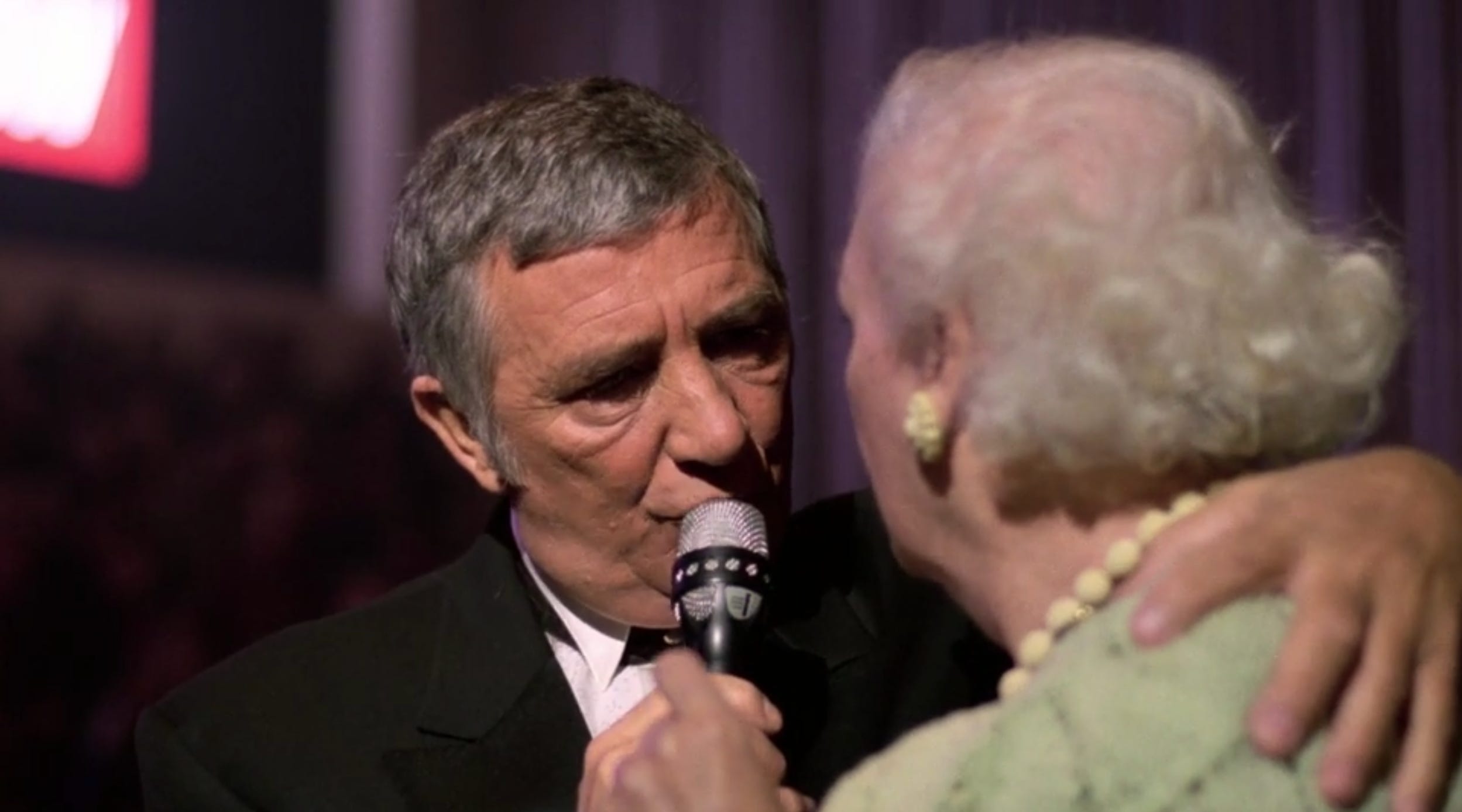Indignity Vol. 2, No. 2: Play our home edition.
SPECULATIVE FUTURE DEP'T.

The Future Will Hunt You Down
A special crossover edition, in which the Indignity and Read Max newsletters, out of our shared interests in bad futures and popular thrillers, watch a movie together.
TOM SCOCCA, INDIGNITY: How do our old images of the future spread, and fade, and return? I hadn't seen the dystopian Arnold Schwarzenegger vehicle The Running Man since I watched it on VHS, almost certainly in my friend Steve's basement, within a year or so of its release in 1987. It came back to me now because while I was cooking dinner one night I got a sample stuck in my head—the unforgettable voice of Your Host, Richard Dawson, sampled onto a techno track, shouting "It is TIME to START RUNNING." I got out my phone and Googled something like "Richard Dawson Running Man sample song," retrieved the title and artist name of "Temple of Dreams" by Messiah, found it on Spotify, and sent it to my Bluetooth speaker.
In the many years since I'd heard the song and the many more years since I'd watched the movie, I'd forgotten that "It is TIME to START RUNNING" isn't even the most compelling part of the sample—that honor goes to Dawson's lead-in, when he shouts to his TV-in-the-movie live audience: "Who loves YOU? And who do you LOVE??" The famous voice is a musical instrument, belting out the first YOU on what my musician child tells me is an E, then rising to a thrilling G sharp for LOVE?? The cadence stayed in my head for days.
All I could do about it was to look for a streaming copy of the movie—quick plot summary: Schwarzenegger is Ben Richards, a cop convicted on false charges by the totalitarian United States government after he refuses orders to massacre civilians, who is forced to appear on a hit prime-time game show, hosted by the malevolently charismatic Damon Killian (played by Dawson, playing an amplified version of his regular TV persona), in which prisoners are hunted down and killed by a cast of flamboyantly brutal "stalkers" on live TV—and then for a connoisseur of big thrillers and bleak futures to hop into the time machine with me. Hence this joint project with READ MAX. So, Max: What did you, as someone who was not yet a teen in 1987, make of this particular branch of our historio-futuristic timeline?
MAX READ, READ MAX: I hadn't seen this movie since I put it on to watch at the West Coast Video franchise I worked at from about 2001 to 2004. And, if I'm remembering correctly, I didn't even get to finish it, because someone—inspired by the in-store viewing—wanted to rent it.
It's that kind of movie, isn't it? You see it on at the video store—or while browsing through HBO Max's streaming selection—or you get a bit of Richard Dawson stuck in your head—-and you find yourself needing to see it despite not having really thought about it for years. My impression is that it's strangely forgotten, or least underrated, at least compared to the rest of Arnold's unbeatable '80s/'90s run. Which is a shame, because it's so great: the kind of satisfying meal that's very hard to find these days.
What do I make of its futurology? I've been watching a lot of '90s action movies lately—Harrison Ford–type "political" thrillers, which, while not science fiction, precisely, are predictive in their own way, just by virtue of being made right after the collapse of the Soviet Union and needing to find some kind of grand narrative to plug the action setpieces into. And I can say, for all their purported technological and political sophistication, none of those movies (except maybe Enemy of the State) understood the general direction of the American experiment as well as The Running Man does.
I don't know that we need to give it too much credit on that score. There's a sort of index-fund–investing principle at work in science fiction, where you can spend a lot of time and money extrapolating out futures and making specific, empirically sound predictions about what will and won't happen, and you will never be as right as often as the guy whose basic prediction of the future is "there's going to be more reality TV, everywhere, and it's going to be worse, and crueller." But the reason people invest in index funds is that consistent returns are underrated! "Sophisticated" technical prediction in sci-fi ages extremely quickly; simply glancing at the popular entertainments of a given moment and saying "that, but more, and worse!" tends to produce "prescient" and long-lasting fiction.
I read on Wikipedia that Arnold believed that this version didn't get at the more sophisticated themes of the book (which I've never read, admittedly), and was filmed "like a TV show," and I felt like shouting [Arnold voice] Noooo! It's exactly because it is filmed like a TV show and the cast consists mostly of wrestlers and TV personalities (and Mick Fleetwood?) that the movie is so great. Can you imagine the ponderous, prestige version of this, written and directed by the Westworld people? I imagine the trailer for it would have, like, a children's choir cover of "Runnin' With the Devil." It would be very sophisticated and filled with themes and it would unbelievably boring. This one has a Dutch opera singer wearing Lite-Brite!
What did you, as someone who was a teenager in 1987, make of it at the time, and now? And, speaking of Dynamo, who is your favorite stalker?
INDIGNITY: I experienced The Running Man, when it happened, as a point of overlap (maybe the main point of overlap) between two genres—one obvious and big at the time, one more undefined but enduring. The first was that it was an Arnold Schwarzenegger movie. We watched so many of them (mostly on VHS in Steve's basement) that they mostly didn't really register as discrete entities. There was the concise and flawless work of art that was The Terminator, but around it was a sort of electron cloud of spectacle and violence, orbiting Arnold's unvarying muscles and accent and self-quoting dialogue. Predator, True Lies, The Running Man, Total Recall...sometimes Jesse Ventura was there, sometimes it only felt as if Jesse Ventura was there. Maybe the clearest evidence of how blurry it all was is that, as of this writing, the Wikipedia page for Schawrzenegger's catchphrase "I'll be back" does not mention The Running Man, even though Ben Richards goes out of his way to say it to Killian right before our hero gets rocket-sledded out into the lethal obstacle course, for the hunt to begin.
The other genre, in which The Running Man stood out as a more memorable landmark, is what I call Idiotopian works—those movies and TV shows that do that thing you just described, taking the most debased and moronic tendencies of present-day culture and imagining what happens if everything stays the same, only more so. The Idiotopian vision has quietly had a more productive long tail than the orthodox Schwarzenegger blockbuster, carried on through works like Idiocracy and Sorry to Bother You, but I now realize that 1987 was probably the year for that mood; besides The Running Man, it brought us Paul Verhoeven's RoboCop, which is the definitive masterwork on the theme, and the American network TV premiere of Max Headroom.
Max Headroom began with the tagline "20 minutes into the future," and it's kind of amazing how useless it is to apply strict this-then-that chronology to the development of the cultural events that The Running Man predicted and/or manifested. American Gladiators, in which a cast of flamboyant muscle figures with nonlethal props beat up contestants trying to run an obstacle course, didn't reach TV until 1989; nevertheless, it was already being developed years before The Running Man ever came out.
You mentioned "reality TV," but in 1987 the concept of "reality TV" had not yet been articulated; part of my confusion when the industry did start calling things "reality TV" around the turn of the century was that, aside from the creepy pure-surveillance programs like Big Brother (or MTV's The Real World, which debuted in 1992, before the genre label was in place), these were all just game shows.
Still, there were two major visual notes that, when seen in 2022, pinned The Running Man down to a precise historical moment. One was when Ben met with members of the anti-government resistance in a bar on the apocalyptic slum-fringes of Los Angeles, where the scavenged decor included a neon sign advertising Coors Extra Gold. Coors Extra Gold sits on a very specific radiocarbon layer of consumer history; it was the first time my age cohort ever encountered a brand of beer (my buddy Walt had access to it) that was marketed on the idea that beer could and should taste strongly like beer. Sam Adams and the microbrewery/brewpub revolution were still two years over the horizon. I hadn't thought about Coors Extra Gold for decades.
The other—and this was truly upsetting to realize—is that Arnold Schwarzenegger looks...kind of normal? Delicate, even, from certain angles? At the time, he was so preposterously bulked-up relative to everyone else that the muscles were all you saw when you looked at him. Thirty-five years, one Russell Crowe career, and two dozen-plus Marvel Cinematic Universe movies later, my eyes have been trained to expect all actors to look like action figures. Like you, I was most entertained by Dynamo among all the stalkers, but I was puzzled to realize that the middle-aged Fireball, with his gray-streaked hair and well-I-guess-I-gotta-do-this melancholy air, was not primarily there for his character-acting chops, but because he was Jim Brown, a physically overpowering legend in two different sports. That body type wouldn't cut it in a ponderous 2022 remake!
READ MAX: It's hard to argue against Dynamo as the most entertaining, but I find myself strangely fascinated by Professor Subzero, played by the great wrestler Charles Kalani, Jr., who was known in the ring as Professor Toru Tanaka but is probably most famous now as Francis's butler in Pee Wee's Big Adventure. Professor Toru Tanaka was exactly the kind of blunt Japanese stereotype you'd expect out of professional wrestling, but Professor Subzero is… a murderous ice-hockey player? I don't want to give the movie a ton of credit for not immediately fitting its villains to ethnic stereotype, but it's hard for me not to imagine how quickly a room of 1987 Hollywood executives and script doctors would have turned him into "Ninja" or something worse…
Race, actually, is maybe one of the arenas where The Running Man's prescience fails, for whatever reason. The cast is relatively diverse, and—while not three dimensional, exactly—not reduced to stereotype. But beyond the general vision of a white upper class and a less white class of sIumdwellers, both of whom we catch only in glimpses as they watch the game show, it's not really clear how race is supposed to function in the idiotopia. From the vantage point of 2022—and especially when you consider that The Running Man, the game show, is the entertainment wing of a state carceral complex—this absence feels strange. But this may be "careful what you wish for" territory: I'm not sure I want the makers of The Running Man to tackle race, so to speak. (I do however want to know the origins of Professor Subzero—where he learned to ice skate, etc. Can we get Jon Favreau or someone to do that for Disney+?)
It's true, Schwarzenegger looks "normal"—or at least not like a completely fake, action-figure human being. He's so fun to watch, too. Each punchline delivered by Arnold in The Running Man is a beautiful layer cake: enjoyable as a dumb joke, enjoyable as a dumb joke delivered woodenly, enjoyable as the mannered performance of woodenness by an actor who knows that sometimes it's best to present, rather than hide, your weaknesses. His performance made me wonder why he wasn't in more "idiotopia" movies—by my count there's this and Total Recall (and, arguably, Last Action Hero?). His performances and demeanor—blankly enthusiastic; charismatic but totally unbelievable—are so perfect for movies about psychotically stupid commercial-entertainment dystopias; you could easily give him a role in Sorry to Bother You without hurting the movie's mood or vibe at all.
The other great performance in the movie is, of course, Richard Dawson, putting all of his formidable skills and experience to work. If we're looking for the Trump angle—you just texted me to remind me that Art of the Deal was also published in 1987—it's there in Dawson's character: his backstage contempt for his audience, his on-camera high-energy nonsense. That E-to-G-Sharp cadence that Messiah picked up on for "Temple of Dreams" is, like Trump's weird voices and scattershot syntax, the kind of instinctive thing only true TV stars can do.
INDIGNITY: The Running Man's non-engagement with racism seems like one facet of its biggest anachronism, from the vantage point of those of us living in the real-world future that unfolded after 1987—which is that, like so many dystopias and idiotopias, it's not really pessimistic enough.
Some of the movie's details are so flawlessly prophetic they might not even register as predictions with younger viewers: the prominent Adidas logos on the contestant/victims' spandex bodysuits, or the voice-activated smart-home devices, or the pivotal role in the plot of then-unattainable deepfake video footage.
Yet fundamentally, and now depressingly, the plot still envisions a world where the public cares about truth. The producers of the Running Man television show are liars and propagandists, but their goal is to serve the state by creating and defending a favorable consensus reality. You've written elsewhere about the movie trope where at the climax, the heroes bring forth and show the people indisputable evidence of the hidden truth, and the villains' lies and their power fall to pieces, like Sauron's armies when the Ring goes into the fires of Mount Doom. When the resistance, at the cost of great sacrifice, manages to hijack the satellite transmission of the Running Man TV program, the very first thing they tell the audience—before they even play the unedited video showing that Richards was actually trying to stop the massacre he was convicted of committing—is "KILLIAN IS LYING TO YOU."
In real life, the viewers wouldn't be fazed at all to hear that Killian was lying to them! That's what we've learned since 1987, in ever more indisputable detail. People want Killian to lie to them! If other people are upset that Killian is lying, all the better.
People don't watch television, or consume other mass media, out of any desire of theirs to see a world constructed on facts. Taking over a whole issue of the New Yorker in 1980, in the essay that became the book Within the Context of No Context, George W.S. Trow included a parable of warning:
The most important moment in the history of television was the moment when a man named Richard Dawson, the "host" of a program called Family Feud, asked contestants to guess what a poll of a hundred people had guessed would be the height of the average American woman. Guess what they've guessed. Guess what they've guessed the average is.
There is no shared ground of reality, only warfare over perceptions of perceptions. A politically meaningful fraction of Americans, presented with matching overhead photos of the Mall from Obama's and Trump's inaugurations, will tell pollsters that the picture with fewer people in it has more people in it. They know which picture is their picture.
Despite itself, The Running Man does understand the darker truth about spectacle and propaganda. In the middle of the show, after the stalkers chasing Richards have started to fall, Killian pulls an elderly woman from the audience and asks her which one of the remaining stalkers she predicts is going make the next kill. To his astonishment, and over his protests, she declares she's picking Ben Richards. "That boy's one mean motherfucker!" she says happily. Out in the streets, bettors immediately demand the chance to start wagering on Richards.

All of this is happening long before the resistance has had its chance to jam the transmission and clear Ben's name. As far as the old woman and the betting public are concerned, they're rooting for the convicted Butcher of Bakersfield, slaughterer of innocents—because he kicks ass. That, not the revelation of documentary truth, is what Killian is powerless to stop.
Killian gets this, which is why as Schwarzenegger's indomitable Running Man turns the game around and closes in on him, the host makes him the obvious offer: drop the vengeance and sign a contract to join the show as a newly minted stalker. Proven star power! Maybe that's where a 2020s version could catch up with and overtake the prescience of 1987—what if an updated Arnold goes ahead and takes the deal? Who balks anymore at being a sellout?
READ MAX: You're taking the words right out of my mouth! That All the President's Men–ish ending is to my mind the worst thing about the movie. (I'd say the most dated, except that we still seem to have a significant number of people—journalists, no less—who believe strongly in the persuasive political power of Facts.) The movie even seems to realize this, ending as it does with the violent spectacle of Dawson's extrajudicial but undeniably high-energy death rather than, I don't know, The Forces of Good arresting him and reading him his rights. And remember, the Mick Fleetwood–led rebels are liberal constitutionalists!
Your point about the Butcher of Bakersfield stan army is a good reminder that while Dawson might be the literal Trump figure here—the asshole game show host lording his power over his audience—it's Arnie who is the metaphorical Trump: a politically marginal outcast who ruthlessly leverages his televisual charisma into real political power, winning supporters and toppling national institutions to the enormous surprise of even the most venal and cynical elites. He even has his own ragtag band of radical ex-cons and marginal has-beens and never-wases to bring along into the halls of power!
I should probably stop myself at "Trump is the Running Man" (Is Jesse Ventura's Captain Freedom Biden, Obama, or Hillary?), but the other Pessimistic Update question that occurred to me as I watched is, what happens if you don't see the introductory vignette of Richards refusing to fire on unarmed civilians? I mean, what if you spend most of the movie assuming that he is the Butcher of Bakersfield, and you root for him because he's Arnie and the movie's on his side? Do you trust Dawson's version of events, or the one that we're told María Conchita Alonso "finds" in the archives? You usually start movies with sequences like that just to establish to the audience that the main character is A Good Guy—but I wonder if in this case it was as much a matter of the movie's creators reminding themselves that Richards was A Good Guy, because they didn't trust the audience to really care either way.
Anyway. I'd love to watch the version where Richards agrees to become a stalker. If we have to do this as a multi-season prestige TV show, as everything has to be now; then season two can be about him selling diet supplements on Instagram in between killing Running Man contestants; season three can be about him going on The Bachelor; etc. Otherwise we'd have to watch him form a government with Mick Fleetwood and Dweezil Zappa. Boring!





